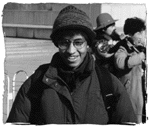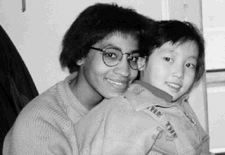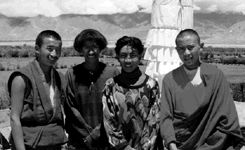
What's it like being a black person in China?" is a question I am frequently asked by other foreigners. A valid enough question, but one that always frustrates me because I never know how to answer. Race never seemed such an overwhelming issue for me until I came to China--being human is difficult enough without adding the baggage of racial stereotypes. Being a representative of African-Americans is a burden I have staunchly refused to bear at home, but one that is unavoidable here.
I admit I had negative impressions of China when I left for Yunnan University
in Kunming in September 1994. Four years earlier, while studying in Shanghai
during an Oberlin semester abroad, I met several African students who had
already spent five or more years at Chinese universities. On the whole, they
were satisfied and happy, but a few complained about prejudice. They were
never very specific; however, the Lonely Planet travel guide describes a series
of ugly incidents at a university where dating between African students and
Chinese women sparked riots. Chinese male students paraded around campus yelling,
"Kill the Black Devils!" In the end, the African students had to be evacuated,
although they were eventually reinstated. Reading that, I wondered if China
was located in Asia or the Deep South.
Happily, my China experience has not included any incidents like that. I haven't even noticed an overt difference in the way I am treated by the average Chinese in contrast to white foreigners. My sense is that the Chinese are more color conscious than racist. In fact, Africans--and, by extension, all blacks--have been viewed as Marxist compatriots ever since the Maoist period, when African nations were the only ones to maintain ties with China.
Moreover, historically based racism as found in America is a deadweight not much in evidence here. America's legacy of slavery and Jim Crowism has been widely propagandized in China, creating strong feelings of sympathy, but creating some romanticized notions as well. I once helped give a lecture on African-Americans to a graduate-level American culture class. The questions the students asked me indicated their sentimentalized view of African-Americans' history: "Do you feel the pain of your ancestors?" "Do you feel any spiritual closeness with Africa?"
 While the stereotypes of the black male criminal and the welfare mother don't
exist here, more benign but still frustrating assumptions and prejudices do.
Take the Chinese people's standard of beauty, for instance. Even if I were
Naomi Campbell's twin sister, I would be considered nothing less than hideous
here because the standard is the paler the prettier. Historically, the only
people in China who had dark skin were the poor peasants and day laborers;
the aristocratic class valued pale skin as an indicator of wealth. Urbanites
still go to great lengths to avoid tanning.
While the stereotypes of the black male criminal and the welfare mother don't
exist here, more benign but still frustrating assumptions and prejudices do.
Take the Chinese people's standard of beauty, for instance. Even if I were
Naomi Campbell's twin sister, I would be considered nothing less than hideous
here because the standard is the paler the prettier. Historically, the only
people in China who had dark skin were the poor peasants and day laborers;
the aristocratic class valued pale skin as an indicator of wealth. Urbanites
still go to great lengths to avoid tanning.
Then there's NBA basketball, which has caught on like wildfire here. Michael Jordan is probably more well known than Michael Jackson and Whitney Houston put together. When my father visited me he was beset with the question, "Do you play professional basketball?" Even if people didn't come up to say anything, I could hear them whispering among themselves, speculating about which team he plays for. There are plenty of tall, white foreigners, but no such chatter follows them since everyone knows NBA players are all black. In America, talk like that could cause a brawl, but these words were spoken with such innocence that we couldn't get upset. Most people were so amazed by Dad's height that we didn't have the heart to say that at 6'3" he's way too short to play. Not to mention, he's pushing 50.
Being ethnically homogenous, the Chinese still do not understand that race is not a clear indicator of nationality. As I walk down the street, comments like "Look, an African" echo behind me. All foreigners have to deal with the annoying cries of Laowai (foreigner). But rather than including an assumption about a person's identity, that reaction merely states a simple truth. Still, two years of nonsense like that can be grating. There is no anonymity. I must constantly justify myself against queries such as, "How can an American be so black?"
Sometimes, unless a person's skin literally is black, the Chinese won't know
what he or she is. People have guessed that I'm anything from Malaysian to
Mexican. For the first few months, the maids in our buildings insisted I must
be from India despite my explanations to the contrary. Knowing that such assumptions
stem from ignorance and lack of exposure, I try not to personalize the issue.
Instead I make a game of it. Occasionally, when my nerves are really shot,
I choose different nationalities to assume. My favorite is Brazilian because
it keeps people from practicing their English on me. However, I quickly discovered
that almost any lie works, taking the fun out of the game. People believe
me no matter how outlandish my lies, even when I tell them I'm Swedish.
The most potent measure of status in the Chinese mind is not skin color, but class. As a holder of an American passport, I'm seen as inhabiting the most advanced and developed nation in the world. Thus, I'm automatically placed in a high class, earning instant respect, regardless of my race. I can almost see the transformation in people's eyes as I move from being just another foreigner to a privileged American, the blackness of my skin becoming irrelevant. I'm sure part of the reason Africans experience greater discrimination here is because they are perceived as being even poorer than the Chinese.
These are solely my own impressions. I have had the opportunity to talk with some Chinese people about race. They do not see the issue in quite the same light as I, but their comments are interesting.
My Chinese teacher has taught foreigners for more than 15 years. In that time she created her own hierarchy, which she feels accurately describes different races and nationalities. In her words, black people are espicially smart and hardworking because, due to discrimination, they have had to work harder to gain the same opportunities whites have readily available. She also regards Asians ( not including Japanese and Thai) as especially diligent. Chinese of course top the listas being resourceful, hardworking, loyal and blessed with the most intelligence. Americans, in her eyes are clever and efficient with well-developed analytic skills. Europeans she places at the bottom, claiming they are lazy and only concerned with having fun. While her remarks certainly cast me in a favorable light, this list of stereotypes disturbs me. Even a woman who has interacted with thousands of foreigners cannot see them as individuals.
Thai) as especially diligent. Chinese of course top the listas being resourceful, hardworking, loyal and blessed with the most intelligence. Americans, in her eyes are clever and efficient with well-developed analytic skills. Europeans she places at the bottom, claiming they are lazy and only concerned with having fun. While her remarks certainly cast me in a favorable light, this list of stereotypes disturbs me. Even a woman who has interacted with thousands of foreigners cannot see them as individuals.
Another friend used the interracial dating incidentto deny the existence of racism. Even though the majority of Chinese agree that dating someone of another race is wrong, she proudly pointed out that the rioters had been punished. The general public also condemned the students' actions--even though they sympathized with the anger that caused the violence.
I pointed out such thinking is racist, but she thought not. Such attitudes aren't directed solely at blacks, she explained; Chinese feel that way about all foriegners.
I guess that makes everything okay.
Alexix Collins was a Shansi representative to Yunnan University in Kunming from September 1994 until August 1996. Reps write four letters a year to the Shansi Association, detailing their experiences. "Reflections from Kunming" was originally her last letter home. An East Asian studies and economics major at Oberlin, Alexis is now enrolled in law school at the University of Chicago, where she is completing her first year of studies. Photo of Alexis and Tanya Lee courtesy of the Shansi Association; all others courtesy of Alexis Collins.
Return to the OAM Spring 1997 Table of Contents